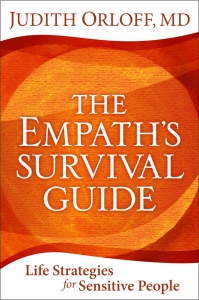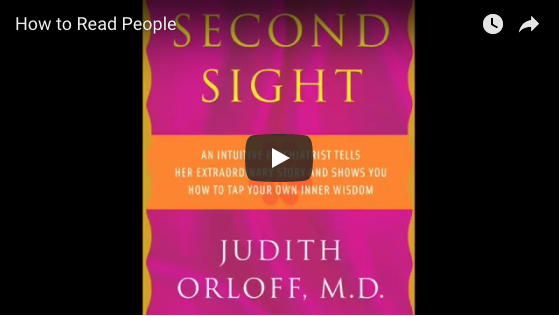Are you an empath? To learn coping skills, get my PDF “Life Strategies for Sensitive People” here.
 As you go through the intuitive healing process you need to know: each of us has our own special power. We carry it within; it waits to be awakened. Call it your inner self, your spirit, or light–however conceived, you must meet and come to know your core-essence. The source of all intuition, it is your fiercest ally and advocate against danger. By connecting with this part of yourself you’ll mount confidence, feel safer in the world. Then whatever or whoever crosses your path–even the devil incarnate–will be no match for your resilience.
As you go through the intuitive healing process you need to know: each of us has our own special power. We carry it within; it waits to be awakened. Call it your inner self, your spirit, or light–however conceived, you must meet and come to know your core-essence. The source of all intuition, it is your fiercest ally and advocate against danger. By connecting with this part of yourself you’ll mount confidence, feel safer in the world. Then whatever or whoever crosses your path–even the devil incarnate–will be no match for your resilience.
I want you to flush out beliefs that divert you from your intuitive healing power. Begin by asking yourself, “What in my life throws me off center and why?” I’m referring to everything from a stranger flashing you a dirty look, to fear of rejection, to dealing with someone in pain. Interactions where your energy dims. Weak spots, points that need securing. And what about negativity? How do you deal with yours, or another’s? If a supervisor says, “You’ll never be successful,” or an ex-lover announces, “You’re incapable of a healthy relationship,” do you buy into it? We each have our triggers. The basis for centering and protection is grasping where we get caught, and then disengaging the trigger.
Four common beliefs that drain your intuitive healing power:
1. I’m not strong enough to protect myself.
As children, many of us aren’t taught to believe in the full power we contain. Yes, our parents may support our intelligence, talents, physical attractiveness–even teach us sound ethical values, the difference between right and wrong. But what happens to our inner self? Might even devoutly religious parents fail to realize it is there? Our starting point is to recognize we possess a very real internal source which enables us to deeply see and know. Yet when something goes wrong, frequently our first impulse is to look outside ourselves for someone to “fix” us. We get sick; we rush to the doctor. We become depressed; we call a therapist. We’re in pain; we take a pill. It’s fine to seek expertise–but we have it backwards. Look inside first. Really, it’s not a big blank in there. Then act on what your wisdom tells you. What stops us? A likely culprit is the vulnerable child we each carry within. Mogul or mailman, mother or monk, this aspect of our psyche yearns to be taken care of, protected, and is unequipped to do it alone. He pops up in the darndest circumstances, reducing us to a helpless tiny tot. Of course we must tenderly acknowledge her needs–but know where to draw the line. Would you want a baby running your boardroom? Your life? Remember: Your inner self is more than your inner child. Far grander–capable of ministering to all your needs–is the radiance of your spirit. Feeling this, knowing this, is the best protection of all. You must become your own champion before anyone else can. When you believe in yourself, no one else can diminish you.
2. Other people’s negative thoughts can harm me.
In my workshops, I’m struck by how worried participants are about being thwarted by other people’s negative thoughts. Such concerns need to be addressed. On an intuitive healing level, ill intentions or feelings can affect us, creating anxiety or physical dis-ease. We must train ourselves to deflect them. What is negative energy? Any force antithetical to your well-being. How does it turn up in everyday life? Let’s start at the lower end of the spectrum. Your neighbor doesn’t approve of you. A friend puts down your plan to start college at forty. Your ex-boyfriend’s girlfriend is sending you bad vibes. What do you do?
Strategies to develop intuitive healing:
3. I’m too sensitive for my own good.
The arch-enemy of intuition is lack of sensitivity. Know this: There is no such thing as being overly sensitive. To grasp the concept, you may have to reconfigure old ideas that have been drummed into your head. When parents or teachers said, “You have to toughen up,” or especially with boys, “only sissies cry,” unknowingly they were undermining the very crux of your intuitive tie with the world. Male sensibility, in particular, has been bludgeoned by such rigid conditioning. But, for both sexes, to break down childhood armoring requires extraordinary commitment, trust, and resolve.
What I’m speaking of isn’t simply expressing your emotions. It’s slowly learning, in your own time frame, to remain wide open to an intuitive realm–being one with the wind, the moon, other people’s joys, sorrows, the continuum of life and death. From this comes an intimate ecstatic bond with all of existence, exactly what you don’t want to protect yourself from. Sensitivity only turns against you when you feel overwhelmed. But how do you stay receptive and not get obliterated by the intensity of such input? It is possible to remain vulnerable and feel safe. The answer is never to shut your sensitivity off but to develop it as a creative resource.
4. It’s my job to take on the pain of others.
We’re trained that as big-hearted people it’s laudable to try to relieve the pain of others. A homeless person holding a cardboard sign, “I’m hungry. Will work for food” at a busy intersection; a hurt child; a distraught friend. It’s natural to want to reach out to them, ease their angst. But many of us don’t stop there. Inadvertently, we take it on. Suddenly we’re the one feeling desolate, off kilter, bereft, when we felt fine before. This loss of center is what I want to address. It does not serve us. I am adamant: the most compassionate, effective route to healing people is to be a supportive
presence, not attempt to live their pain for them. Moreover, sometimes suffering has its own cycle that has to be respected, hard as that may be to witness.
We must lie to rest the old metaphysical prototype of the empathic healer. Typically grossly obese women (extra weight, they mistakenly argued, was the only way to stay grounded), who cured patients by absorbing symptoms with the technique of laying on of hands. The result? Patients would leave feeling better; the healers would be a sickly wreck. These women were convinced such a sacrifice was necessary to lessen the suffering of others. As a young physician, I almost got snagged in the same trap. During the first months of private practice, I used to drag myself home, flop into bed half-dead from everything I’d absorb: a sure path to burn-out. This tack wasn’t good for me or my patients.
I’ve learned the value of being a catalyst for people’s growth without compromising my well-being. Patients themselves have taught me I can’t do the work for them. That is not my job. Nor is it yours. Keep this in mind: it is none of our business to deprive anyone else of their life experiences. I understand the impulse to want to make things better. Compassion and the desire to console are human. But there’s a fine line between supporting someone and trying to do it for them. No matter how well-meaning or heartfelt your intention, doing too much is not an act of love but of sabotage. You can be caring and honest with someone, yet still let them be. Don’t equate honoring their growth process with abandoning them. A practical philosophy of intuitive healing must include preserving your energy as well as serving others. Striking a balance is essential.
Adapted from Dr. Judith Orloff’s book,“The Empath’s Survival Guide: Life Strategies for Sensitive People” (Sounds True, 2017)
Learn the Art of Reading People’s Energy




